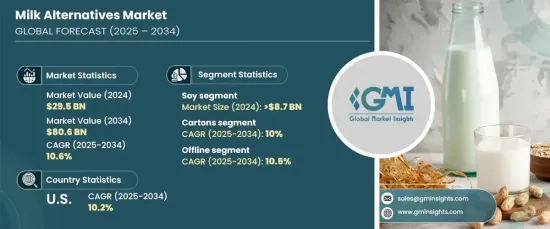
세계의 우유 대체품 시장은 2024년 295억 달러가 되었으며, 2025-2034년까지 CAGR 10.6%로 예측되어 유망한 성장 궤도에 있습니다.
우유 대체품은 전통적인 유제품을 대체하는 식물성 음료로 유당 불내증 소비자, 특정 식단 요구에 따라 소비자, 채식주의자 및 지속 가능한 선택을 선호하는 소비자들 사이에서 인기를 얻고 있습니다. 이러한 혁신적인 제품은 다양한 옵션을 제공하며 식물 유래의 보다 건강하고 친환경적인 식품 솔루션에 대한 수요 증가에 부응하고 있습니다.

이 시장은 건강과 웰빙에 대한 소비자의 의식 증가, 환경 문제에 대한 관심 증가, 비건 라이프 스타일 채용 확대로 급속히 확대되고 있습니다. 더 깨끗하고 지속 가능한 식사 옵션을 찾는 사람들이 늘어남에 따라 식물 유래 우유가 선호됩니다. 특히 맛과 영양가 개선을 통해 우유 대체품의 품질을 향상시킬 기회가 풍부합니다. 소매 채널 전반에 걸친 우유 대체품의 가용성 확대와 지속가능성을 지원하는 정부의 이니셔티브이 함께 시장 성장을 더욱 촉진하고 있습니다.
| 시장 범위 | |
|---|---|
| 시작 연도 | 2024년 |
| 예측 연도 | 2025-2034년 |
| 시작 금액 | 295억 달러 |
| 예측 금액 | 806억 달러 |
| CAGR | 10.6% |
두유 부문은 2024년 추정 시장 규모가 87억 달러였으며, 예측기간 중 CAGR 10%로 견조하며 앞으로도 시장에서 중요한 지위를 유지할 전망입니다. 두유는 기존의 유제품에 필적하는 고단백질 함량과 영양 프로파일로 알려져 있으며, 건강 지향의 개인과 채식주의자의 정평이 되고 있습니다. 두유는 식음료, 조리, 식품 제조에 범용성이 있기 때문에 식물성 식생활에 빠뜨릴 수 없는 선택이 되고 있습니다. 아몬드 우유와 오트밀 우유와 같은 새로운 우유 대체품가 계속 인기를 얻고 있는 반면, 두유의 골격은 견고하며, 특히 대두 소비에 오랜 역사가 있는 지역에서는 지속적인 수요가 확보되고 있습니다.
카톤 포장 부문의 우유 대체품 시장은 2024년에는 174억 달러에 달했고, 2034년까지 10%의 연평균 복합 성장률(CAGR)로 성장할 것으로 예측됩니다. 판지 포장은 지속가능성, 편의성 및 제품의 신선도를 유지하는 능력에서 지원됩니다. 재활용 가능한 재료로 만든 카톤은 환경 의식이 높은 소비자와 환경 발자국을 최소화하기 위해 노력하는 기업의 가치에 부합합니다.
미국 우유 대체품 시장은 2024년에 103억 달러를 창출했고, 2034년까지 CAGR 10.2%가 될 전망입니다. 유당 미사용, 식물 유래, 비건 친화적인 선택에 대한 수요의 급증은 우유 대체품의 영양면과 환경면에서의 이점에 대한 소비자의 의식의 고조가 원동력이 되고 있습니다. 다양한 풍미와 강화 옵션을 포함한 다양한 제품이 널리 이용 가능하기 때문에 전국의 슈퍼마켓, 건강식품점, 카페에서 인기가 확고해지고 있습니다.
The Global Milk Alternatives Market, valued at USD 29.5 billion in 2024, is on a promising growth trajectory with a projected CAGR of 10.6% from 2025 to 2034. Milk alternatives, plant-based beverages designed to replace traditional dairy milk, are gaining popularity among consumers who are lactose intolerant, follow specific dietary needs, or prioritize vegan and sustainable choices. These innovative products provide a diverse range of options, catering to the rising demand for plant-based, healthier, and environmentally friendly food solutions.

This market is experiencing rapid expansion due to heightened consumer awareness of health and wellness, increasing environmental concerns, and the growing adoption of vegan lifestyles. As more people seek cleaner and more sustainable dietary options, plant-based milk has become a preferred choice. Opportunities abound in enhancing the quality of these alternatives, particularly through improved taste and nutritional value. The expanding availability of milk alternatives across retail channels, coupled with government initiatives supporting sustainability, is further fueling market growth.
| Market Scope | |
|---|---|
| Start Year | 2024 |
| Forecast Year | 2025-2034 |
| Start Value | $29.5 Billion |
| Forecast Value | $80.6 Billion |
| CAGR | 10.6% |
The soy milk segment is poised to remain a significant force in the market, with an estimated value of USD 8.7 billion in 2024 and a robust CAGR of 10% through the forecast period. Renowned for its high protein content and nutritional profile comparable to traditional dairy milk, soy milk is a staple for health-conscious individuals and vegans alike. Its versatility in beverages, cooking, and food production adds to its appeal, making it a go-to option in plant-based diets. While newer alternatives like almond and oat milk continue to gain traction, soy milk's strong foothold, particularly in regions with a long history of soy consumption, ensures sustained demand.
The milk alternatives market from the carton packaging segment is anticipated to reach USD 17.4 billion in 2024 and grow at a CAGR of 10% through 2034. Carton packaging is favored for its sustainability, convenience, and ability to preserve product freshness. Made from recyclable materials, cartons align with the values of eco-conscious consumers and businesses striving to minimize their environmental footprint.
In the United States, the milk alternatives market generated USD 10.3 billion in 2024 and is expected to achieve a projected CAGR of 10.2% through 2034. A surge in demand for lactose-free, plant-based, and vegan-friendly options is being driven by increasing consumer awareness of the nutritional and environmental benefits of milk alternatives. The widespread availability of diverse products, including various flavors and fortified options, has solidified their popularity in supermarkets, health food stores, and cafes nationwide.